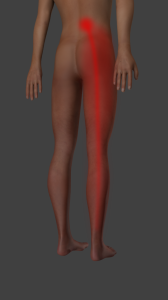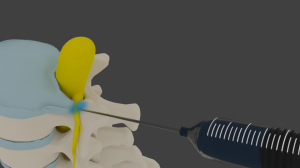Sciatica results from a pinched nerve in the low back and can lead to burning, searing, electrical type pain running down one of your legs. Thankfully, with proper nonoperative pain management treatment, most individuals are able to avoid an operation.
When should an individual consider surgery for a sciatica problem?
There are three reasons an individual should consider undergoing what is known as a  lumbar discectomy for the pinched nerve. The surgery is typically very successful, but it does involve anesthesia and there are some small risks.
lumbar discectomy for the pinched nerve. The surgery is typically very successful, but it does involve anesthesia and there are some small risks.
The first indication is what is known as an absolute indication. It comes from a condition known as Cauda Equina syndrome. This is when the disk herniation is so large that it pinches on the lowest area of the spinal cord. It can lead to bowel and bladder dysfunction along with numerous other neurologic deficits. Unfortunately, these can become permanent.
Surgery for this condition should be performed within 24 hours of onset to give the patient the best chance of a reversal of the neurologic problems. If done right away, the chances of a successful outcome are very good.
The second indication for a micro discectomy is if there is a neurologic deficit. For instance, if the pinched nerve causes difficulty with lifting up the foot, this is known as a foot drop. Depending on where the pinching occurs, the deficit and weakness seen will vary.
The concern is that it is unclear if the muscle weakness is simply observed then over how much time the weakness will not even respond to surgery. So when it comes to how long to wait when muscle weakness occurs due to a pinched nerve, there really is no black and white definition. It may be okay to wait 3 to 6 months, but there is that unknown outcome if it doesn’t resolve and surgery becomes necessary. So the lumbar discectomy surgery when a nerve root deficit with weakness is present is known as a relative indication for surgery.
The third indication for decompressive surgery when a pinched nerve is present is when the pain is too much to bear and conservative treatment is not helping. This would be a

Epidural Injection
case where an individual is having significant pain from the pinched nerve, but there is no muscle weakness. The person may also have significant numbness.
The typical time frame that has been put forth as a reasonable time frame is six to eight weeks of conservative treatment. This may include medications, an epidural injection or a series of them, physical therapy, chiropractic treatment and possibly acupuncture as well. Spinal decompression therapy may be helpful too.
If six weeks goes by and it is simply not getting better, then as a quality of life indication, the decompression surgery can be performed. There is well over a 90% chance that the pain will resolve quickly after surgery. Studies have shown that the outcome at the one year point is the same, whether or not surgery is undertaken as an elective decision.
So these are the three indications for surgery for sciatica. Over 95% of individuals are able  to avoid the procedure with proper pain management. Arizona IMA offers a Phoenix work comp doctor, Dr. Demitri Adarmes, who is a Double Board Certified pain doctor.
to avoid the procedure with proper pain management. Arizona IMA offers a Phoenix work comp doctor, Dr. Demitri Adarmes, who is a Double Board Certified pain doctor.
The clinic is a premier Arizona and Federal Work comp clinic offering comprehensive nonoperative services, and excels in the administrative side of the claims too.






Leave A Comment